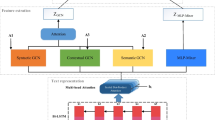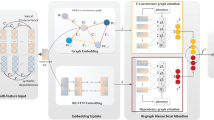Abstract
In this digital era, there are many reasons to investigate the positive and negative opinion: a lot of irrelevant or error-related information exists, and major changes can strengthen or undermine past knowledge due to the newly discovered information. Speculation and negation principles are used as a significant influence in determining the factuality of occurrences or words. Negation reverses the validity of argument to maximize or decrease the doubt regarding the opponent and conjecture. Deep learning recently demonstrated has increased ability to distinguish truthful and non-true knowledge. Moreover, different languages were used in most of the previous approaches. To our understanding, the negative or hypothetical concept in biomedical texts in English is not known in previous work. This work will establish an adaptive visual geometry group network (VGG Net) based on CNN models for the identification and rejection of statements (negated or speculated sentences, etc.). The applied models are tested by considering the English corpus BioScope. Finally, as a result, the statistical study confirms that the performance of the proposed models surpasses our original baseline on F1-Score.




Similar content being viewed by others
References
Al-Khawaldeh FT (2019) Hierarchical attention generative adversarial networks for biomedical texts uncertainty detection. Int J Adv Stud Comput Sci Eng 8(6):1–12
Chen T, Xu R, He Y, Wang X (2017) ‘Improving sentiment analysis via sentence type classification using BiLSTM-CRF and CNN. Exp Syst Appl 72:221–230
Cruz NP, Taboada M, Mitkov R (2016) A machine-learning approach to negation and speculation detection for sentiment analysis. J Assoc Inform Sci Technol 67(9):2118–2136
Dey A, Jenamani M, Thakkar JJ (2018) Senti-N-gram: an n-gram lexicon for sentiment analysis. Exp Syst Appl 103:92–105
Fabregat H, Araujo Serna L, Martínez Romo J (2019) Deep learning approach for negation trigger and scope recognition.
Fancellu F, Lopez A, Webber B (2018) Neural networks for cross-lingual negation scope detection.
Hemmatian F, Sohrabi MK (2019) A survey on classification techniques for opinion mining and sentiment analysis. Artif Intell Rev 52:1–51
Hung BT (2020) Integrating sentiment analysis in recommender systems. Reliability and statistical computing. Springer, New York, pp 127–137
Jiang H, Kwong C, Kremer GO, Park W-Y (2019) Dynamic modelling of customer preferences for product design using DENFIS and opinion mining. Adv Eng Inform 42:100969
Kang T, Zhang S, Xu N, Wen D, Zhang X, Lei J (2017) Detecting negation and scope in Chinese clinical notes using character and word embedding. Comput Methods Programs Biomed 140:53–59
Keshavarz H, Abadeh MS (2017) ALGA: adaptive lexicon learning using genetic algorithm for sentiment analysis of microblogs. Knowl Based Syst 122:1–16
Khan FH, Qamar U, Bashir S (2017) A semi-supervised approach to sentiment analysis using revised sentiment strength based on SentiWordNet. Knowl Inform Syst 51(3):851–872
Li W, Zhu L, Shi Y, Guo K, Zheng Y (2020) User reviews: sentiment analysis using lexicon integrated two-channel CNN-LSTM family models. Appl Soft Comput 94:106435
Morente-Molinera JA, Kou G, Samuylov K, Ureña R, Herrera-Viedma E (2019) Carrying out consensual group decision making processes under social networks using sentiment analysis over comparative expressions. Knowl Based Syst 165:335–345
Nakov P, Ritter A, Rosenthal S, Sebastiani F, Stoyanov V (2019) SemEval-2016 task 4: sentiment analysis in Twitter.
Qian Z, Li P, Zhu Q, Zhou G, Luo Z, Luo W (2016) Speculation and negation scope detection via convolutional neural networks. In: Proceedings of the 2016 Conference on Empirical Methods in Natural Language Processing, pp 815–825.
Saleena N (2018) An ensemble classification system for twitter sentiment analysis. Proced Comput Sci 132:937–946
Swidan NA, Guirguis SK, Abood OG, Hameed AS (2019) Text document clustering using hashing deep learning method. Int J Soft Comput 14(2):44–52
Sathish R, Ezhumalai P (2020) Sentiment analysis for hard dataset with lexicon, NCCA based alstm model. J Crit Rev 7(19):3165–3176
Santiso S, Casillas A, Pérez A, Oronoz M (2019) Word embeddings for negation detection in health records written in Spanish. Soft Comput 23(21):10969–10975
Wang G, Sun J, Ma J, Xu K, Gu J (2014) Sentiment classification: the contribution of ensemble learning. Decis Support Syst 57:77–93
Wen S, Wei H, Yang Y, Guo Z, Zeng Z, Huang T, et al (2019) Memristive LSTM network for sentiment analysis. IEEE Trans Syst Man Cybern Syst
Zainuddin N, Selamat A, Ibrahim R (2018) Hybrid sentiment classification on twitter aspect-based sentiment analysis. Appl Intell 48(5):1218–1232
Zhang S, Kang T, Zhang X, Wen D, Elhadad N, Lei J (2016) Speculation detection for Chinese clinical notes: impacts of word segmentation and embedding models. J Biomed Inform 60:334–341
Zou B, Zhou G, Zhu Q (2016) Research on Chinese negation and speculation: corpus annotation and identification. Front Comput Sci 10(6):1039–1051
Author information
Authors and Affiliations
Corresponding author
Ethics declarations
Conflict of interest
The author declares that they have no conflict of interest.
Human and animal participant
Humans and animals are not involved in this research work.
Additional information
Publisher's Note
Springer Nature remains neutral with regard to jurisdictional claims in published maps and institutional affiliations.
Rights and permissions
About this article
Cite this article
Sathish, R., Ezhumalai, P. Enhanced sentimental analysis using visual geometry group network-based deep learning approach. Soft Comput 25, 11235–11243 (2021). https://doi.org/10.1007/s00500-021-05890-3
Accepted:
Published:
Issue Date:
DOI: https://doi.org/10.1007/s00500-021-05890-3




